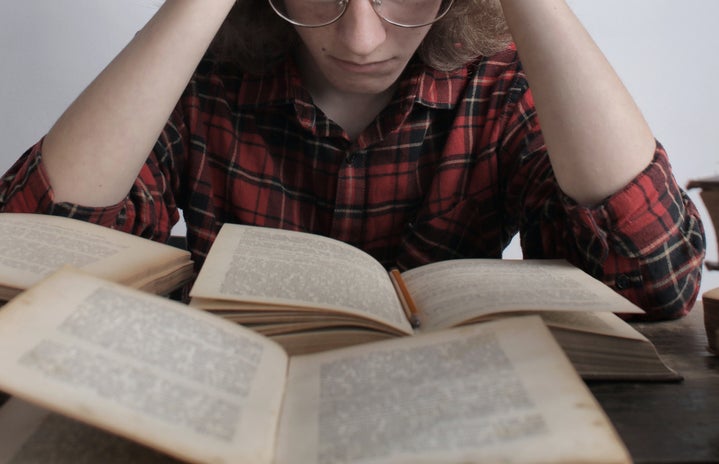While aimlessly scrolling through my TikTok feed, a video of lawyer Julian Sarafian appears in front of me. As he was speaking on different elements of being accepted into law school, my curiosity had overtaken me, and I was now binge-watching his content. During this same time, I was awaiting either college acceptance or rejection letters, nauseous at the idea of not attending a university that would act as an assurance that all the anxiety and overwhelming AP workload was worth it. Simultaneously, in January of 2022, videos of Sarafian being vulnerable about his mental health and its relation to academics and workload consumed my feed.
Julian Sarafian Before TikTok
Sarafian’s parents are immigrants with Vietnamese and Armenian ancestry, yet they lived in what he refers to as “the slums of Paris.” Sarafian, however, was born in Folsom, California, in a Sacramento suburb. He had previously believed that he was interested in medicine during high school. He reveals, “I thought, okay, medicine, you make a stable income. You get to help people and people respect the profession, so it makes sense.” However, he realized that his interest was for policy, and in his final year of high school, he made the decision to pursue law school. He began his undergraduate studies at the University of California, Berkeley after graduating from high school. Along with the obvious, a strong LSAT score and a high GPA are significant considerations in applications to law school.
Throughout his undergraduate years, Sarafian had the goal of optimizing his GPA at Berkeley which he jokes about and says, “which is not the best school to go to, for your GPA. Period.” With his pursuits of attending law school, he had been studying for the LSAT, full-time, for six months. In addition, Sarafian had been enhancing his application with internships at law firms, the White House and research jobs under professors. He shares in his description of his undergraduate years: “It can feel for a lot of people like that whole coming of age and where we just kind of find ourselves. For me, it was much more like this is the stepping stone for the next thing, which is partially why I think I didn’t have as much fun.” Despite this, Sarafian is satisfied with his college experience. The feelings he experienced during his college years can be attributed to a problem that first-generation students with immigrant parents may face— money.
Sarafian shares, “with so much on the line financially for me and how much my parents were paying for undergrad and, how much law school is going to cost? That was the thing that was driving me more than anything else. It was financial security. As I graduated early, I did three years instead of four and that was purely financial. I would have loved to stay for another year or two or three, and it’s fun. But it has a cost, you know, 35K a year at the time and I was in state tuition too.”
Law School and Corporate Jobs
After graduating college, Sarafian committed to attending New York University School of Law. Since he had graduated early, he had applied to law school through early admissions and had decided to just continue his studies after undergraduate, directly. He was then interested in seeing whether his accomplishments during his 1L (first year of law school) would lead to entrance into top law schools like Harvard or Stanford. Sarafian received acceptance letters from both institutions before deciding to enroll at Harvard Law School.
When questioned about the reasoning for his choice to attend Harvard, he responds, “The name brand is probably the most important, but also the networking, the exit opportunities and the network that you join.” As evidence of the advantages and effectiveness of Harvard education, Sarafian claims, “If I were to look at my career, I mean my rise on social media, I attribute it to Harvard, right? Not just the fact that I talk about mental health, and I’m a lawyer doing this content, but it’s that effect that the H-bomb has on people. It just provides a lot of credibility.”
The first year of law school had been the hardest for Sarafian, who had been studying 80 to 90 hours a week. He claims that after finishing his first year, he was finally allowed to take his foot off the gas for the first time in his academic career. He graduated from Harvard Law School, passed the bar exam and was qualified to practice law at his desired job.
On-campus interviews were a common way for Harvard law students to land jobs. Fortunately for Sarafian, his interview went well, and he was offered a position at a law firm. When he first joined the firm, he was working between 60–90 hours per week and was constantly on-call virtually. Sarafian continues, “that’s not the worst thing in the world, but there are elements to the big law culture that made it hard to stomach. For one, sometimes the work just didn’t need to be done that quickly at all and it was purely a power play on behalf of clients or your superior attorneys.” The already competitive workplace was then heightened by the 2020 COVID pandemic, and the lines between work and home life were blurred.
Lawyers were struggling to cope with the increasing workload while isolated at home, but their efforts weren’t acknowledged at the partner level. After that, burnout resulted from a lack of boundaries. Sarafian started working part-time in an effort to combat the decline in his mental state. He did, however, come to the conclusion that: “The ultimate boundary was my job, so I quit.” He then goes on to say, “I felt like the benefits from working on myself and focusing on mental health were just so much more important to me at the time than what that job was giving me.”
Sarafian’s New Era
Sarafian detailed his struggle with suicidal idealization, depression and anxiety on his LinkedIn page after opting to resign from his position. As a result of the popularity of this post, he started posting content on TikTok about applying to law school, his personal experiences, and raising awareness of mental health struggles. Then, in March 2022, Sarafian delivered a TEDx talk titled “The Cost of Success” that made reference to his difficulties with mental health. Since a year ago, Sarafian has grown his own firm, which specializes in defending social media content creators.
He says that a new TED Talk highlighting the efforts of his firm will be released within the coming year. Sarafian shares, “This one is focused on how content creators are getting ripped off on social media, both by brands and by the social media platforms itself. And so, it talks a lot about my work with my firm and how we need to advocate for creators’ interest. They are builders on the Internet and the Internet is here to stay and so we need to take care of that.” Sarafian has been able to inspire others and build bridges between communities by promoting mental health awareness.
Be sure to follow Sarafian on Instagram to learn more!
Want to see more HCFSU? Be sure to like us on Facebook and follow us on Instagram, Twitter, TikTok, YouTube and Pinterest!


